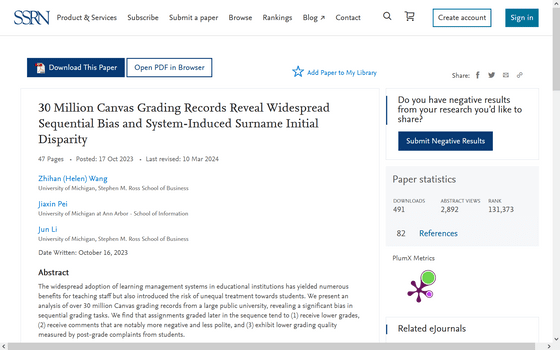It has been reported that the later the attendance number, the lower the grade.

They found that when graders grade consecutive assignments, the later the grader, the lower the grade. Because graders usually grade in alphabetical order, the lower the grader's grade, the lower the grade, resulting in an average difference of about 0.6 points.
30 Million Canvas Grading Records Reveal Widespread Sequential Bias and System-Induced Surname Initial Disparity by Zhihan (Helen) Wang, Jiaxin Pei, Jun Li :: SSRN

Study: Alphabetical order of surnames may affect grading | The University Record
Researchers at the University of Michigan analyzed more than 30 million grades and assessments at the university and found that students whose names appear later in the alphabet tend to get lower grades than those who appear earlier.
According to Helen Wang and her colleagues, students with surnames beginning with A, B, C, D, and E tended to receive grades on average 0.3 points higher, while students with surnames beginning with U, V, W, X, Y, and Z tended to receive grades on average 0.3 points lower.
Additionally, students who were later in the alphabet were significantly more likely to receive negative and rude comments from faculty, and were more likely to ask questions or request regrades after grades were released.

To be precise, this phenomenon means that the earlier the students are graded, the higher their scores will be, and the later the students are graded, the lower their scores will be. However, since most educational institutions grade students in alphabetical order, it seems that there is inevitably a bias due to names. In fact, when the order of the names was randomized, the bias due to names was reduced, and when the students were graded in reverse order from Z to A, A's scores were lower.
Wang and his colleagues hypothesized that graders' ability to spot errors might improve as they grade more tasks, or that they might become fatigued and lose focus after working on something for a long period of time.

'Our conclusion is that bias like the one we found in this study may occur unconsciously and have real social consequences,' said Wang. 'A difference of 0.6 points may be small, but it can have a big impact on grades and GPAs, and ultimately on retention rates. The simplest solution to reduce name bias is to randomize the grading order, and in large classes, adding more graders would also be an option.'
◆ Forum is currently open
A forum related to this article has been set up on the official GIGAZINE Discord server . Anyone can post freely, so please feel free to comment! If you do not have a Discord account, please refer to the account creation procedure article to create an account!
• Discord | 'Have you ever been treated favorably or unfavorably because of your attendance number?' | GIGAZINE
https://discord.com/channels/1037961069903216680/1232260194889764864
Related Posts:
in Science, Posted by log1p_kr







